
«I personally guarantee that we will honestly and decently do our job!»
Managing partner
Lawyer, Doctor of Laws, recognized media expert on legal issues, legal adviser to famous politicians and businessmen.
THE DEPUTY CHIEF OF THE SBU OF THE CITY OF KYIV WAS REINSTATED AND REMOVED FROM THE LIST OF DISCLAIMER
The legal justification for the illegality of the dismissal from the position was, among other things, the inconsistency of certain provisions of the Law of Ukraine "On Purification of Power" with the Constitution of Ukraine, by the decision of the District Administrative Court of Kyiv dated 09.12.2014, the proceedings in the case were stopped until the Constitutional Court of Ukraine resolved the submissions of the people's deputies of Ukraine on the constitutionality of the provisions of parts 3, 6 of article 1, parts 1-4, 8 of article 3, point 2 of part 5 of article 5, point 2 of the Final and Transitional Provisions of the Law of Ukraine "On Purification of Power", the Supreme Court of Ukraine on the constitutionality of point 6 of part 1 , point 2 of part 2, point 13 of part 2, part 3 of article 3 of the Law of Ukraine "On Purification of Power" and the Foreign Intelligence Service of Ukraine regarding the official interpretation of the provisions of point 7 of part 1, point 3 of part 2 of article 3, part 3 of article 4, subsection 1 Paragraph 2 of the Final and Transitional Provisions of the Law of Ukraine "On Purification of Power" in conjunction with the provisions of Part 2 of Article 1 of this Law, states of Article 19 of the Constitution of Ukraine in relation to the provisions of its Article 64 and the specified provisions of the specified Law.
In view of the long consideration of the above-mentioned constitutional proceedings, because the further suspension of the proceedings in this case called into question the observance of the principle of legal certainty as a component of the principle of the rule of law, pointed to a violation of reasonable terms of consideration and called into question the availability of effective legal remedies in Ukraine, JSC "Prikhodko&Partners" filed a motion to resume proceedings in the case.
Revocation of dismissal order
Thus, by order, the person was dismissed from the post of deputy head of the Main Directorate of the Security Service of Ukraine in the city of Kyiv and the Kyiv region based on the information available in the personnel file.
At the same time, the only factual basis for the dismissal of a person from his position was his holding the position of deputy head of the Security Service of Ukraine in the period from 04.08.2011 to 02.02.2013 and the distribution, in this connection, provided for in Art. 1, 3 of the Law of Ukraine "On Purification of Power" prohibits the Claimant from holding certain positions.
The legal grounds for the dismissal of the latter from his position were Clause 72, Part 1, Art. 36 of the Criminal Code of Ukraine, Part 3 of Art. 1, item 8, part 1 of Art. 3 of the Law of Ukraine "On Purification of Power", which is directly stated in the Order.
This position testifies to the illegal application to him of the above grounds for dismissal, violation of his labor rights, non-compliance by the Defendant with the principle of the rule of law, legality, objectivity and individuality of legal responsibility.
The above statements are substantiated as follows:
Thus, Clause 72 of Article 36 of the Labor Code of Ukraine stipulates that an employment contract can be terminated on the grounds provided for by the Law of Ukraine "On Purification of Power".
In accordance with Part 3 of Art. 1 of the Law of Ukraine "On Purification of Power" (hereinafter also the Law) within ten years from the date of entry into force of this Law, the positions for which power purification (lustration) is carried out may not be held by the persons specified in the first, second, fourth and eighth parts of Article 3 of this Law, as well as persons who have not submitted the statements provided for in the first part of Article 4 of this Law within the time limit specified by this Law.
Clause 8, Part 1, Art. 3 of the specified Law, it is established that the prohibition provided for in Part 3 of Article 1 of this Law applies to persons who held the position(s) for at least one year in the period from February 25, 2010 to February 22, 2014 as the head, deputy head of the territorial (regional ) of the Prosecutor's Office of Ukraine, the Security Service of Ukraine, the Ministry of Internal Affairs of Ukraine, the central executive body that ensures the formation and implementation of state tax and/or customs policy, the tax police in the Autonomous Republic of Crimea, regions, cities of Kyiv and Sevastopol.
In accordance with part 1, 2 of Art. 1 of the Law of Ukraine "On Purification of Power" purification of power (lustration) is a ban established by this Law or a court decision for certain natural persons to hold certain positions (to be in the service) (hereinafter - positions) (except for elected positions) in state authorities and local authorities municipality.
Purification of power (lustration) is carried out with the aim of preventing from participating in the management of state affairs persons who, by their decisions, actions or inaction, carried out measures (and/or contributed to their implementation) aimed at the usurpation of power by the President of Ukraine Viktor Yanukovych, undermining the foundations of national security and defense of Ukraine or an illegal violation of human rights and freedoms, and is based on the principles of:
- rule of law and legality;
- openness, transparency and publicity;
- presumption of innocence;
- individual responsibility;
- guaranteeing the right to protection.
That is, parts one and two of Article 1 of the Law of Ukraine "On Purification of Power" define the basic, fundamental principles of power purification and provide a definition of the term "power purification", based on which other norms of the specified Law are applied to specific circumstances and persons in their systemic relationship. in connection with the principles of their application, that is, compliance with the specified principles is a prerequisite for the application of the consequences provided for by the Law (conclusion of the Supreme Court, set out in the resolution dated 11/13/2019 in case № 826/3328/16).
The definition of "principle" means the main, important, essential, essential. The principles of law are basic ideas, original provisions that are enshrined in law, have general significance, higher imperative (command) and reflect the essential provisions of law.
At the same time, a general analysis of the provisions of the Law of Ukraine "On the Purification of Power" and the Criminal Code of Ukraine, in particular the prohibitions introduced by it to hold certain positions (to be in the service) on the basis of holding certain positions (including during a certain period) gives grounds for the conclusion that that the application of the said prohibitions to an individual is a specific type of legal responsibility.

At the same time, the basis for bringing to legal responsibility can only be the composition of a legal offense, that is, a set of objective and subjective signs of an illegal socially harmful act provided by law, for the commission of which the guilty person bears legal responsibility (namely: criminal acts, violated by the criminal act of social interests, the cause-and-effect relationship between the criminal act and causing damage to public interests and the guilt of the subject of the offense).
The absence of a legal offense in a person's actions makes it impossible to hold such a person accountable and apply any measure of responsibility to him.
Moreover, the second part of Article 61 of the Constitution of Ukraine establishes the individual character of a person's legal responsibility.
Thus, in the resolution of the Grand Chamber of the Supreme Court dated January 31, 2019, in case № 800/186/17, it is indicated the need to observe the principle of individual responsibility and proportionality in cases related to the application of the provisions of the Law of Ukraine "On Purification of Power".
Adhering to the specified legal position, the Supreme Court reached the following conclusions in its ruling dated 03.06.2020 in case № 817/3431/14:
"Without an analysis of individual behavior, it is impossible to establish the personal guilt of the persons to whom the specified prohibitions have been applied, in order to make sure that individual responsibility is applied to these persons, and not collective, as declared in the principles of Law № 1682-VII, which should guide the process purification of power (lustration).
Without establishing a connection between the specified persons and the usurpation of power, it is impossible to come to the conclusion that the legitimate goal of Law № 1682-VII was achieved - preventing from participating in the management of state affairs those persons who, by their decisions, actions or inaction, carried out measures (and/or contributed their implementation), aimed at the usurpation of power by the President of Ukraine PERSON_2, undermining the foundations of national security and defense of Ukraine or unlawful violation of human rights and freedoms. Therefore, it is not possible to conclude that a fair balance was reached between the protection of the interests of a democratic society, on the one hand, and respect for the plaintiff's rights, on the other.
Therefore, the ban on holding the positions specified in Law № 1682-VII and, as a result, dismissal from these positions, is considered as the establishment of a presumption of collective guilt, and not a presumption of innocence, which indicates inconsistency with the purpose and principles of Law № 1682-VII, defined in part of the second article 1 of this Law".
Taking into account the above, the existence of the following set of criteria and prerequisites, the presence and full compliance of which is necessary for bringing a person to responsibility in the form of a ban on holding certain positions (being in the service) based on holding certain positions (including during a certain period), provided for in According to the Law of Ukraine "On Purification of Power":
- occupation by a person for a certain time in the relevant period of the position defined by the Law of Ukraine "On Purification of Power";
- carrying out (and/or facilitating their carrying out) by a person through his decisions, actions or inaction, measures aimed at the usurpation of power by the President of Ukraine Viktor Yanukovych, undermining the foundations of national security and defense of Ukraine or unlawful violation of human rights and freedoms;
- presence of a legal offense in the person's actions;
- taking into account the principles of rule of law and legality, openness, transparency and publicity, presumption of innocence, individual responsibility, guaranteeing the right to defense when applying legal responsibility.
At the same time, the above-mentioned criteria and conditions for incurring the specified legal responsibility and incurring it must exist in aggregate.
Thus, the legislation of Ukraine, both in force at the time of adoption of the contested Order and in force at the date of these additional explanations, does not provide for any norm that would define as an offense the very fact of occupying a certain position, for example, the position of deputy prosecutor (Similar conclusions are given in paragraph 25 of the resolution of the Supreme Court dated November 13, 2019 in case № 826/3328/16).
In addition, a similar legal position is supported by the European Court of Human Rights in the case "Polyakh et al. v. Ukraine" (Final Decision dated February 24, 2020), where the court stated:
"... the reason for the application of the restrictive measures provided for by the Law "On Purification of Power" is Mr. Yanukovych's coming to power (see paragraph 7), and not any event that undermined the democratic constitutional order that could have occurred during his rule and in which the relevant official could be involved. The court believes that restrictive measures of such severity cannot be applied to civil servants only because they remained in their civil service positions after the election of a new head of state."
Also, the Parliamentary Assembly of the Council of Europe in PACE Resolution № 1096 (1996) draws the attention of member states to the fact that "lustration" is applied to persons in the case of proving their guilt in each specific case, and not as a tool for formal dismissal from office. In particular, in paragraph 12, the Assembly emphasized that, in general, lustration measures can be compatible with a democratic state based on the principle of the rule of law, provided that certain criteria are met:
- firstly, guilt, namely personal and not collective, must be proven in each individual case; it emphasizes the need for individual, rather than collective, application of lustration laws;
- secondly, the right to defense, the presumption of innocence until proven guilty, and the right to judicial review of the decision should be guaranteed; revenge cannot in any case be the goal of such measures, and the lustration process must not allow political or social abuse of lustration results; the purpose of lustration is not to punish persons deemed guilty (this is part of the tasks of prosecutors governed by criminal law), but to protect young democracies.
In addition, in the interim Opinion № 788/2014 СDL-АД (2014)044 dated 16.12.2014 regarding the Law of Ukraine "On Purification of Power", the Venice Commission stated, among other things, that lustration should apply to persons who played an important role in committing serious violations of human rights or who held a leadership position in an organization responsible for serious violations of human rights; no one can be the subject of lustration solely because of personal thoughts and beliefs; knowing employees can be prosecuted only if their actions actually caused harm to others and they knew or should have known about it (paragraph 62)".
 Without an analysis of individual behavior, it is impossible to establish the personal guilt of the persons to whom the specified prohibitions have been applied, in order to make sure that individual responsibility is applied to these persons, and not collective, as declared in the principles of the Law of Ukraine "On Purification of Power", which should direct the process of purification of power (lustration).
Without an analysis of individual behavior, it is impossible to establish the personal guilt of the persons to whom the specified prohibitions have been applied, in order to make sure that individual responsibility is applied to these persons, and not collective, as declared in the principles of the Law of Ukraine "On Purification of Power", which should direct the process of purification of power (lustration).
Without establishing a connection between the specified persons and the usurpation of power, it is impossible to come to the conclusion that the legitimate goal of the Law of Ukraine "On Purification of Power" has been achieved - preventing from participating in the management of state affairs precisely those persons who, by their decisions, actions or inaction, carried out measures (and/ or contributed to their implementation) aimed at the usurpation of power by the President of Ukraine Yanukovych, undermining the foundations of Ukraine's national security and defense, or unlawful violation of human rights and freedoms. Therefore, it is not possible to conclude that a fair balance was achieved between the protection of the interests of a democratic society, on the one hand, and respect for the rights of the plaintiff, on the other.
These legal conclusions are set out in the Supreme Court's decision of June 23, 2021 in case № 826/17490/14.
As far as the circumstances of this case are concerned, the Claimant was dismissed on the basis of the Law of Ukraine "On Purification of Power" exclusively on the criterion of having been in office for more than one year with the application of a 10-year ban on holding positions in respect of which power purification (lustration) is carried out.
At the same time, the Claimant's personal file does not contain information about the presence of facts of illegal behavior aimed at the usurpation of power by the President of Ukraine Yanukovych, the undermining of the foundations of national security and defense of Ukraine, or the illegal violation of human rights and freedoms, and the disputed order does not contain justification to confirm that the Claimant could pose any threat to the new democratic regime.
At the same time, the Defendant did not take any measures aimed at establishing the facts of personal illegal behavior of the Claimant, in particular, inspections. Moreover, the Defendant has never alleged that the Claimant was involved in any human rights violations or the latter's support of anti-democratic measures.
Therefore, in view of all of the above and by virtue of the provisions of Article 58 of the Constitution of Ukraine, no person can be held accountable based on just one fact of occupying a certain position, which was not recognized and is not recognized as an offense in accordance with the requirements of the law.
Thus, taking into account that the Claimant was dismissed from the position held solely on the formal grounds of belonging to the position held by him in the list of positions to which the measures of cleansing the power apply, the order for such dismissal is illegal, unlawful and groundless.
In particular, upon adoption of the contested Order:
- The defendant did not comply with the principle of individual responsibility and the presumption of innocence,
- The Defendant has not established a relationship between the Claimant's tenure in the state authorities and the usurpation of power by V.F. Yanukovych,
- The Defendant did not establish (did not discover) the nature of the legal offense in the actions of the Plaintiff.
Part 2 of Article 19 of the Constitution of Ukraine defines the duty of state authorities and local self-government bodies, their officials to act only on the basis, within the limits of authority and in the manner provided for by the Constitution and laws of Ukraine.
According to Clause 2, Part 1, Art. 5 of the Civil Code of Ukraine, every person has the right, in accordance with the procedure established by this Code, to apply to an administrative court if he believes that his rights, freedoms or legitimate interests have been violated by a decision, action or inaction of a subject of authority, and to ask for their protection by declaring it illegal and cancellation of an individual act or its separate provisions.

Part 2 of Art. 3 of the Civil Code of Ukraine stipulates that in cases concerning the appeal of decisions, actions or inaction of subjects of authority, administrative courts check whether they have been adopted (committed):
- on the basis, within the limits of authority and in the manner determined by the Constitution and laws of Ukraine;
- using the authority for the purpose for which this authority was granted;
- justified, that is, taking into account all the circumstances that are important for making a decision (taking an action);
- impartially (impartially);
- in good faith;
- prudently;
- observing the principle of equality before the law, preventing all forms of discrimination;
- proportionally, in particular with the necessary balance between any adverse consequences for the rights, freedoms and interests of the person and the goals that this decision (action) is aimed at achieving;
- taking into account the individual's right to participate in the decision-making process;
- in a timely manner, that is, within a reasonable period of time.
Therefore, taking into account that the order to dismiss the Claimant was made without establishing the circumstances and conditions that are necessary for making such a decision, without establishing any signs of an offense and without observing the necessary principles of law, such an Order is illegal, unfounded and violates the constitutional rights of the Claimant, in therefore subject to cancellation.
Reinstatementthrough the court
Part 6 of Article 43 of the Constitution of Ukraine guarantees citizens protection against illegal dismissal.
The European Court of Human Rights in the decision of January 9, 2013 in the case "Volkov v. Ukraine", drawing attention to the need to reinstate a person in office as a way to restore violated rights, noted that the court's decision cannot be declarative, without ensuring within the national legal system protection of rights and freedoms guaranteed by the Convention on the Protection of Human Rights and Fundamental Freedoms.
Article 13 of the Convention for the Protection of Human Rights and Fundamental Freedoms (right to an effective remedy) provides that everyone whose rights and freedoms recognized in this Convention have been violated has the right to an effective remedy before a national authority, even if such the violation was committed by persons exercising their official powers.
Thus, an effective method of protection must ensure the renewal of the violated right and must be adequate to the existing circumstances, exclude the subsequent appeal of the person to the court for the protection of the violated rights.
In accordance with Part 1 of Art. 235 of the Labor Code of Ukraine, in case of dismissal without a legal reason or illegal transfer to another job, including in connection with a notification of violation of the requirements of the Law of Ukraine "On Prevention of Corruption" by another person, the employee must be reinstated at the previous job by the body, which considers the labor dispute.
Thus, an appropriate and effective way to protect the Claimant's violated rights, in addition to the cancellation of the Order, is the reinstatement of the Deputy Head of the Main Department of the Security Service of Ukraine in the city of Kyiv and the Kyiv region by issuing an order by the Head of the Security Service of Ukraine on reinstatement from October 23, 2014.
The above is unquestionably confirmed by judicial practice, in particular in cases of appeals against decisions on the release of persons in connection with the extension to them of Article 1, 3 of the Law of Ukraine "On Purification of Power" bans holding certain positions.
In particular, a similar position is set out in the Supreme Court rulings dated 11.06.2020 in case № 826/5602/16 and dated 28.09.2021 in case № 825/3682/14.

Exclusion from the list of those included
Part 1 of Art. 7 of the Law of Ukraine "On Purification of Power" provides that information on persons against whom a ban has been established, provided for in Part 3 or 4 of Article 1 of this Law, shall be entered in the Unified State Register of Persons to whom the provisions of the Law of Ukraine "On Purification of Power" have been applied. which is formed and managed by the Ministry of Justice of Ukraine.
The procedure for forming and maintaining the Unified State Register of Persons to whom the Provisions of the Law of Ukraine "On Purification of Power" (hereinafter - the Register) is applied, as well as the provision of information from it, is determined by the Provisions on the Unified State Register of Persons to whom the Provisions of the Law of Ukraine "On Purification of Power" is applied ", approved by the order of the Ministry of Justice of Ukraine dated 10.16.2014 № 1704/5 (hereinafter also the Regulation).
Clause 9 of the Regulation establishes that registrars, within the limits of their competence, enter into the Register and remove from it in the manner specified by this Regulation, information about persons to whom the prohibition provided for by the third or fourth part of Article 1 of the Law of Ukraine "On Purification of Power" has been applied, provide information from the Register in the cases defined by the second part of Article 7 of the Law of Ukraine "On Purification of Power", perform other functions provided for by this Regulation.
Based on the content of the European Court of Human Rights decision in the case "Polyakh et al. v. Ukraine", the Court considered the entry of information about the applicants into the Unified State Register of Persons, which is publicly available on the Internet, to which the provisions of the Law of Ukraine "On Purification of Power" are applied as one of the three aspects that affected private life of the applicants in the context of Article 8 of the Convention. The Court considered that the combination of these measures had very serious consequences for the applicants' ability to establish and develop relationships with others and their social and professional reputation, and significantly affected them.
The European Court of Human Rights stated that information about the application of the measures to the applicants, provided for by the Law of Ukraine "On Purification of Power", was immediately made public even before their claims were considered.
In this regard, the Venice Commission also expressed its comments on the Law of Ukraine "On Purification of Power", which was also referred to by the European court of human rights during the consideration of the case "Polyakh and others v. Ukraine".
In paragraphs 98-100 of the Interim Opinion № 788/2014, the Venice Commission noted that the provisions of Article 7 of the Law of Ukraine "On Purification of Power" are problematic, according to which information about persons subject to lustration is entered into the Unified Register of Persons Subject to Lustration of this Law, which is created and maintained by the Ministry of Justice of Ukraine, with the publication on the website of the specified ministry of personal data and the results of the verification of the person and providing it for free use.
The Venice Commission recalled that earlier in its advisory opinion regarding the "Former Yugoslav Republic of Macedonia" it stated that "publication prior to the adoption of a court decision is problematic in connection with Article 8 of the European Court of Human Rights. The negative impact of such publication on a person's reputation can hardly be eliminated later by removing her name from the registry, and the victim has no means to protect herself from such negative influence.
The latter may be an adequate measure, necessary in a democratic society, when cooperation is established definitively, not before. Therefore, publication should take place only after the court's decision has been passed" (paragraph 99 of the Interim Opinion № 788/2014).
Since the Law of Ukraine "On Purification of Power" does not guarantee that publication is allowed only after a final court decision, then, according to the conclusion of the Venice Commission, this provision as such raises obvious problems of compatibility with Article 8 of the Convention (paragraph 100 of the Interim Opinion № 788/2014) .
Taking into account the above, it can be seen that the proper way to protect the rights of persons who have experienced illegal publication of information about their belonging to persons subject to the prohibitions provided for by the Law of Ukraine "On Purification of Power" is to remove such information from the Register.
At the same time, in view of the legislative guarantees of the effectiveness of the restoration of violated rights without the person who suffered such a violation, additional actions and costs, actions aimed at restoring the violated rights should be performed by the person who violated the rights of the Claimant.
Thus, according to the conclusions of the Supreme Court of Ukraine, set out in the resolutions dated 31.05.2016 in case № 826/11379/14, dated 10.05.2016 in case № 800/362/15, the method of restoring the violated right must be effective and such that excludes further illegal decisions, actions or inaction of the subject of authority, and in case of non-execution or improper execution of the decision, there should not be a need to appeal to the court again, but the decision should be enforced.
According to Article 13 of the Convention for the Protection of Human Rights and Fundamental Freedoms, everyone whose rights and freedoms recognized in this Convention have been violated has the right to an effective remedy before a national authority, even if such a violation was committed by persons exercising their official powers.
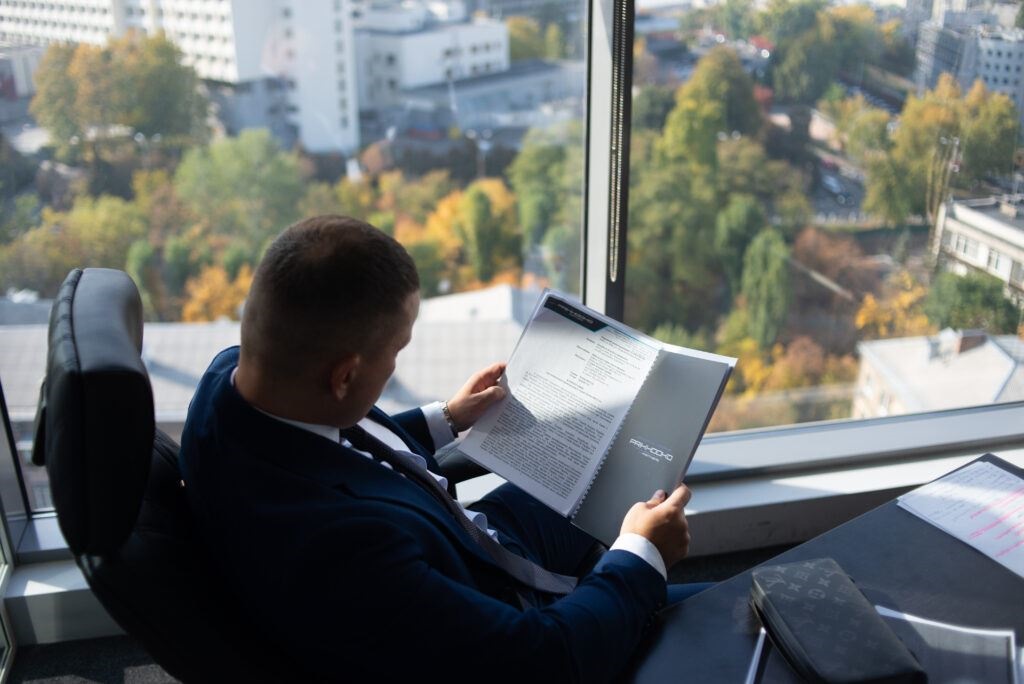 "Effective means of legal protection" in the sense of Article 13 of the Convention must ensure the restoration of the violated right and the person's obtaining the desired result; making decisions that do not directly lead to changes in the scope of rights and ensuring their forced implementation does not correspond to the international norm under consideration.
"Effective means of legal protection" in the sense of Article 13 of the Convention must ensure the restoration of the violated right and the person's obtaining the desired result; making decisions that do not directly lead to changes in the scope of rights and ensuring their forced implementation does not correspond to the international norm under consideration.
The means of protection required by the mentioned article must be effective both in law and in practice, in particular, in the sense that its use is not complicated by the actions or oversight of the authorities of the relevant state (paragraph 75 of the ECtHR decision in the Afanasyev v. Ukraine case dated 04/05/2005 (application № 38722/02).
At the same time, the provisions of Clause 5 of Section II of the Regulation provide that the basis for removing from the Register information about a person to whom the prohibition provided for in the third or fourth part of Article 1 of the Law of Ukraine "On Purification of Power" has been applied is the receipt by the Registrar of: a substantiated decision on cancellation the results of the inspection, which shows that there are no grounds for applying to the person who passed the inspection, the prohibitions defined by Article 1 of the Law of Ukraine "On Purification of Power" by the body that conducted the inspection; the corresponding court decision, which has entered into force.
According to Clause 4 of the Regulation, the holder of the Register is the Ministry of Justice of Ukraine.
Based on the content of the claims and the cited legal norms, as a result of the cancellation of the Order, it can be seen that there is a basis for the Defendant's obligation to inform the Ministry of Justice of Ukraine about the withdrawal of information about the application of the ban to the Claimant, provided for in the third part of Article 1 of the Law of Ukraine "On Purification of Power".
The legal position of a similar content is set forth by the Supreme Court in resolutions dated 15.10.2020 in case № 826/17601/14, dated 04.06.2020 in case № 821/4571/14, dated 07.10.2020 in case № 826/25472/15, dated 09.07. .2020 in case № 816/4476/15, dated 04/28/2021 in case № 802/4043/14-a.
Therefore, taking into account the above, in order to effectively protect the rights of the Claimant, avoid additional time and money costs of the Claimant, court appeals and final resolution of all legal issues with the restoration of rights, it is necessary to oblige the Defendant to provide information (inform) the holder of the Register about the absence of grounds for application to the plaintiff of the prohibitions provided for in the third part of Article 1 of the Law of Ukraine "On Purification of Power".
Taking into account all of the above, the order of the Head of the Security Service of Ukraine № 10/12-OS dated October 23, 2014 on the dismissal of the Deputy Head of the Main Directorate of the Security Service of Ukraine in the city of Kyiv and the Kyiv region is illegal and subject to cancellation with the renewal of the Claimant on the position held and the obligation of the Defendant to inform the Ministry of Justice about the withdrawal of information about the application of the ban to the Plaintiff, provided for in Part 3 of Art. 1 of the Law of Ukraine "On Purification of Power".
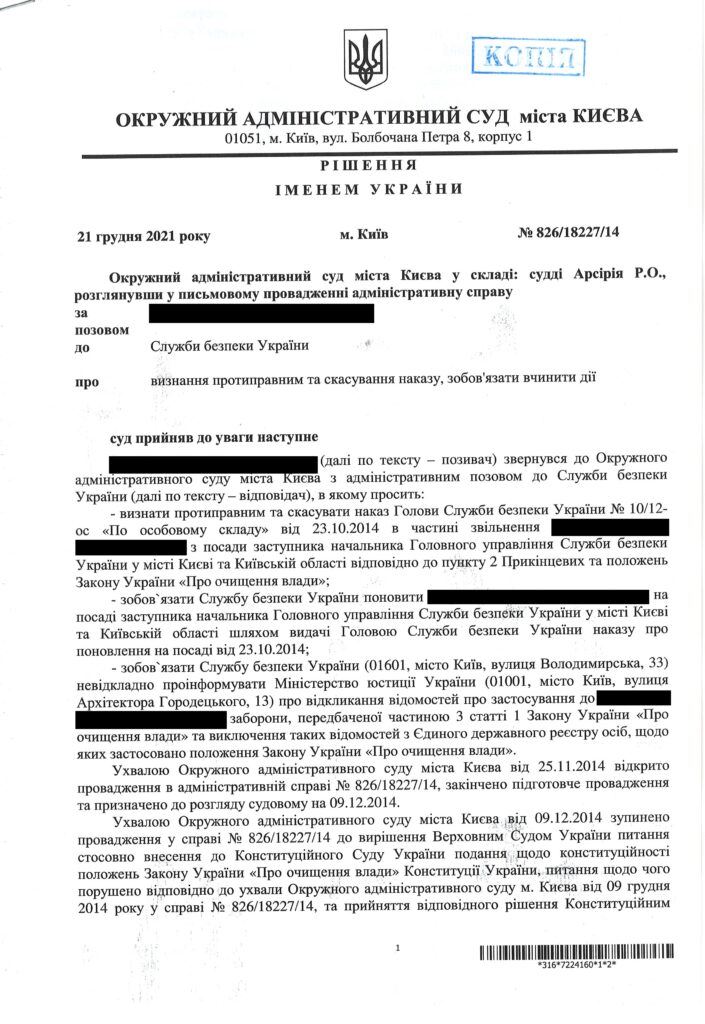
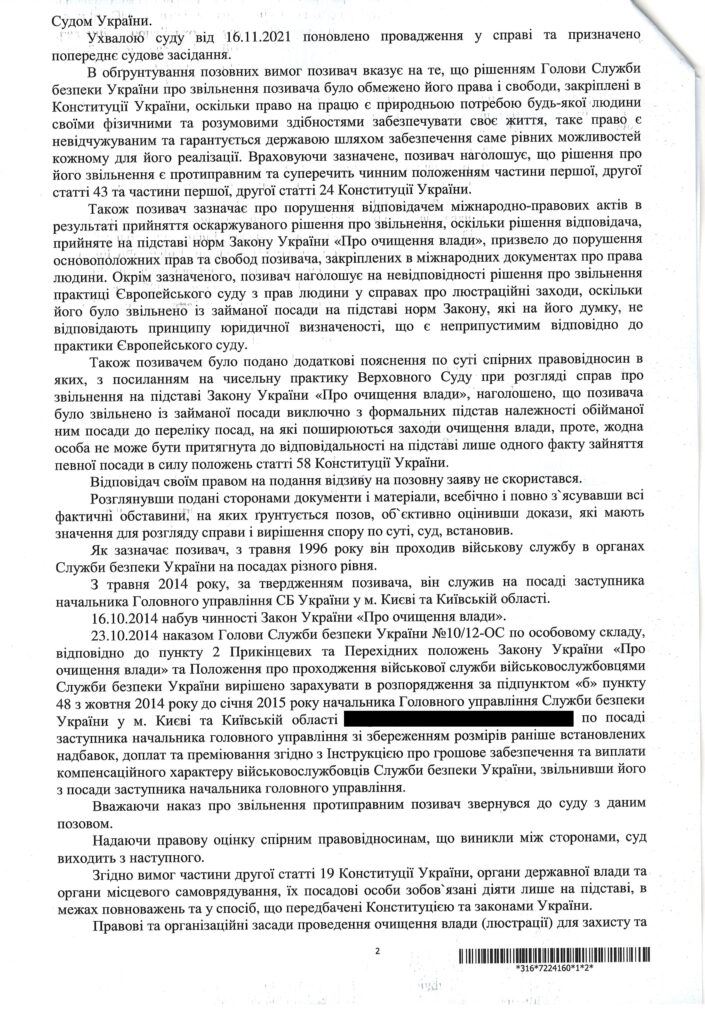
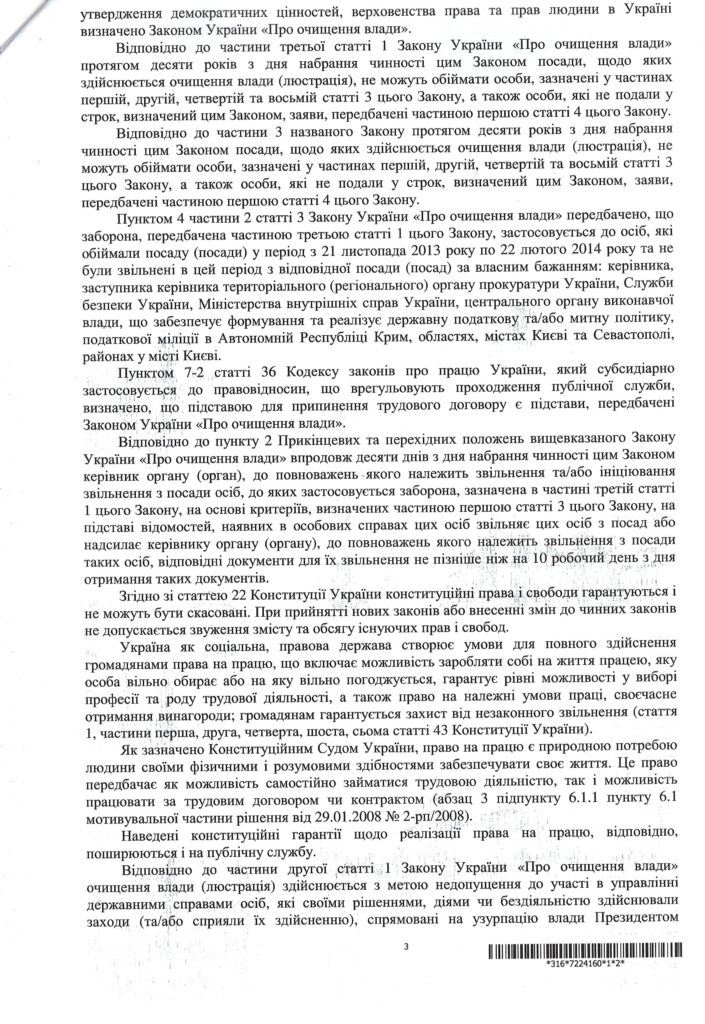
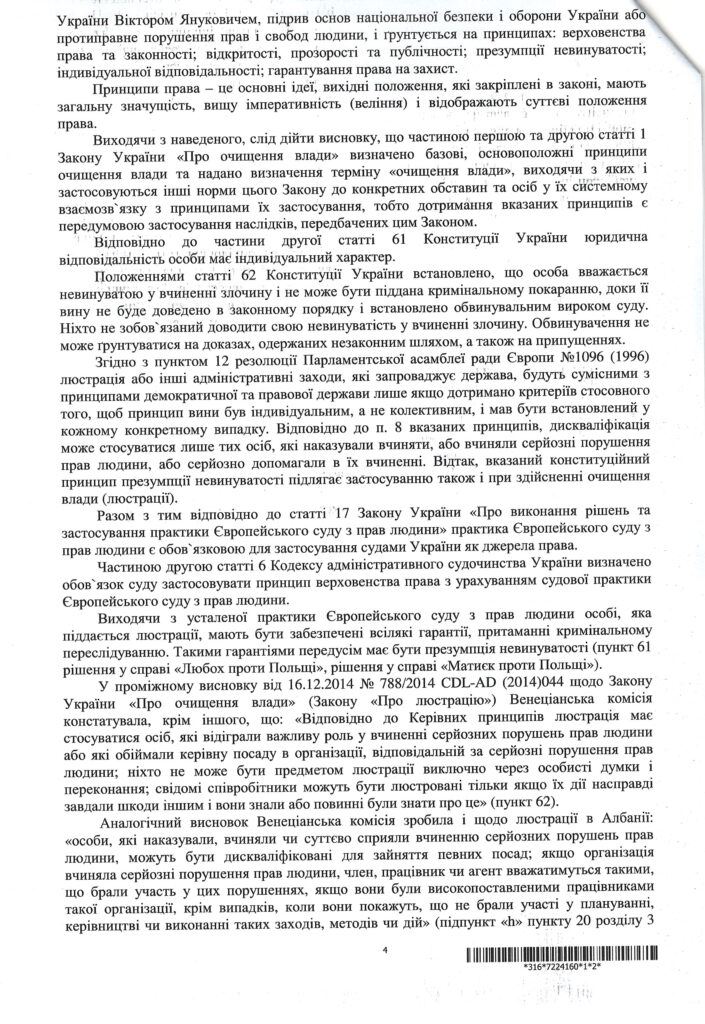

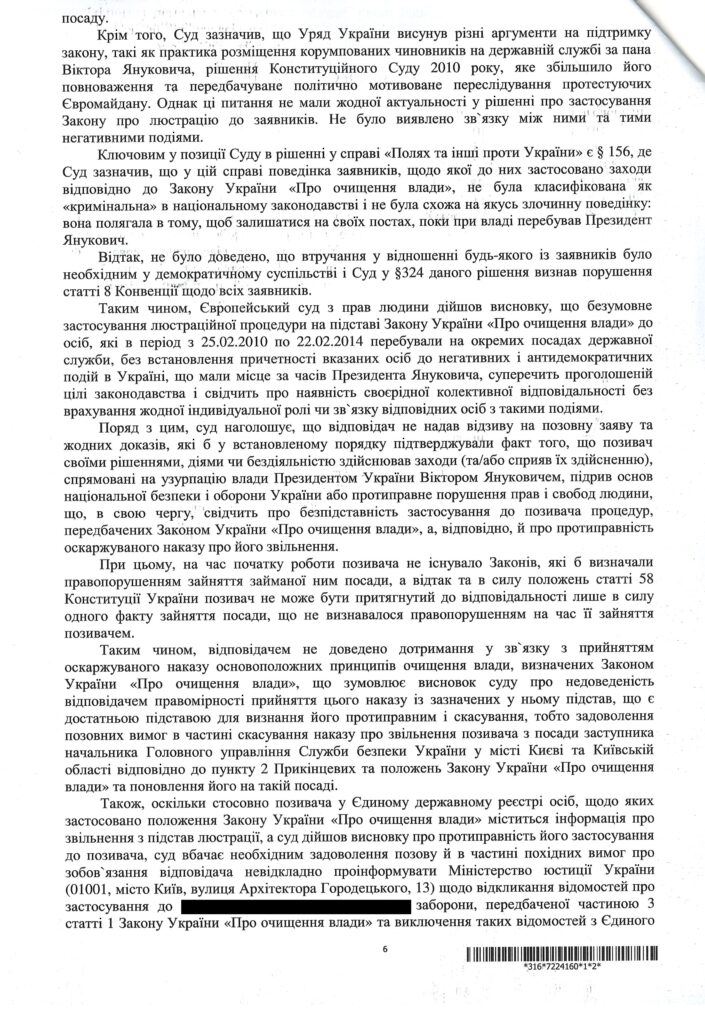

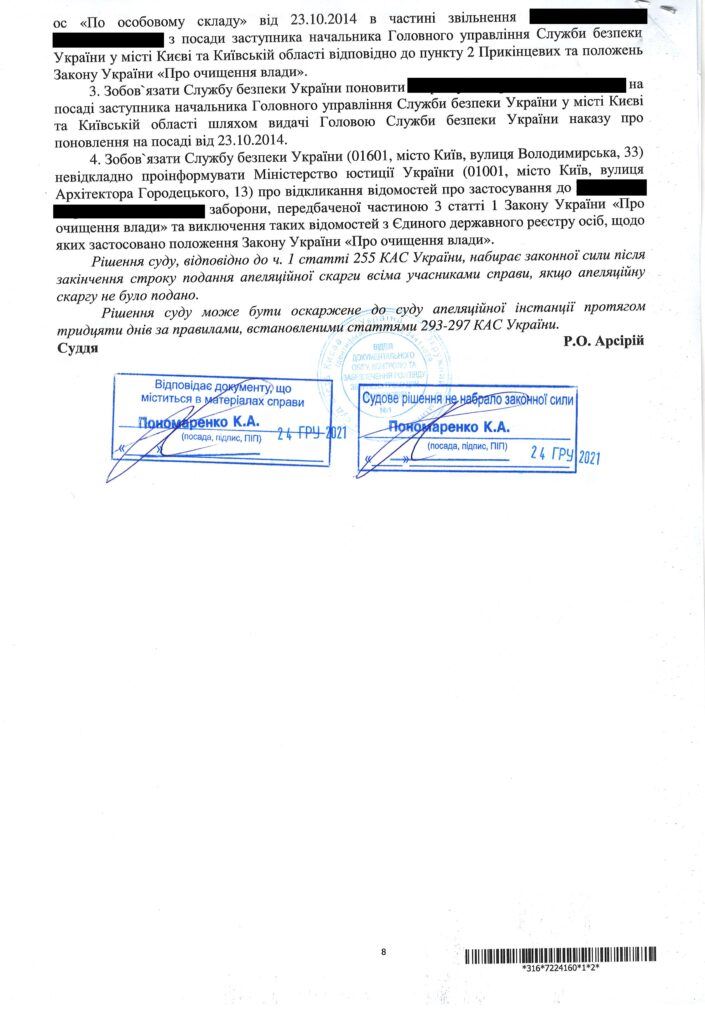
Calculate the price of assistance:
1 question
Have other lawyers handled your case?
2 question
Are you in Kyiv or Kyiv region?
3 question
Do you need legal assistance urgently?
Managing partner
Lawyer, Doctor of Laws, recognized media expert on legal issues, legal adviser to famous politicians and businessmen.
Other articles on this topic:
call back
during the day




